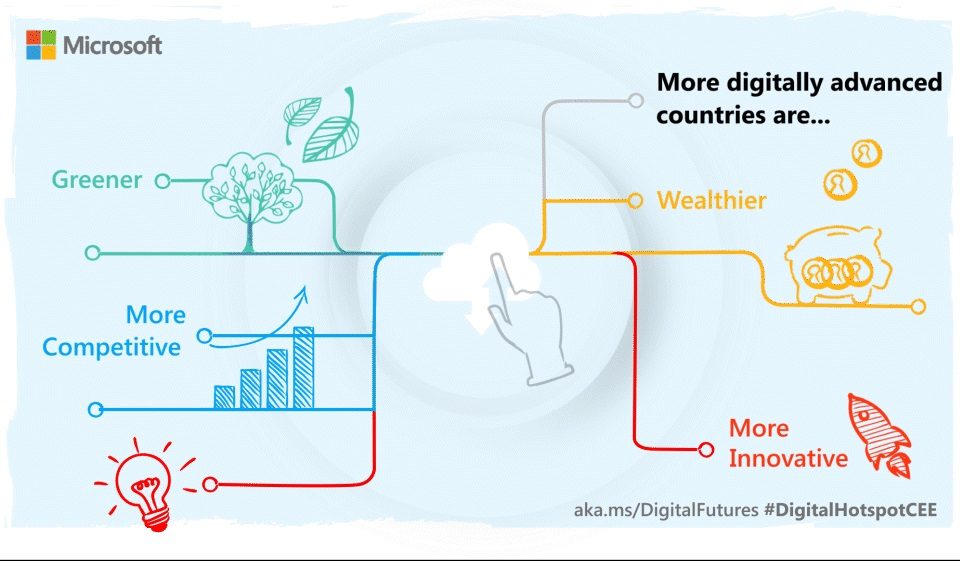Serbia is one of the leaders in ICT exports, which strongly contributes to the GDP – while percentage of women in ICT industry is 40% higher than average for CEE
Microsoft has created Digital Futures Index and analyzed the digitalization level of 16 European countries, Serbia being among them. The Index provides data on the current digitalization of a country and detects the most prosperous areas but also the fields where there is more work to be done to accelerate the process of digital transformation.
Digitalization was analyzed through 5 digital development categories: Digital Business, Digital Government and Public Sector, Digital Infrastructure, Digital Sector, and Human Capital.
Serbia’s total digital development level is 85, which is 15 percent below the average for the Eastern and Central European countries (100 is the number of points defined as the average for Central and Eastern Europe). Serbia performs extremely well in ICT exports and the contribution of the ICT sector to GDP and is one of the countries with the best results when it comes to gender equality of IT professionals. When it comes to cultivating future talents in IT, Serbia is doing well, achieving a high percentage of graduates from ICT and STEM education. All this highlights the country’s potential to accelerate progress in other areas as well, such as the development of digital skills, the modernization of the education sector and the digitalization of public services.
“We have created the Digital Futures Index to help decision makers accelerate digital transformation of the country. Our research has shown that digitally advanced countries are greener, wealthier, more innovative, and more competitive. We in Microsoft believe that Serbia, as a place of IT talents, based on quality education system, education staff, scholars, and students, has strong potential and all the prerequisites for becoming a Digital Hotspot of this part of Europe, which will base its economic development on innovation and modern technologies, such as artificial intelligence,” said Milan Gospić, Country Manager, Microsoft Serbia.
The results of the Digital Futures Index for Serbia as per categories, in reference to the average in Central and Eastern Europe (100 marks the average)
In the Digital Business category, Serbia scored 82 points, 18 percent below the average of the Central and Eastern Europe. From the parameters, we see that Serbia lags by 12% of the average when looking at the number of companies that use the cloud, and 13% when looking at the percentage of companies that employ ICT experts, resulting in a low score of digital competitiveness (76). Although Serbia lags behind the average in terms of digital competitiveness, there is a tremendous potential for growth if more companies embrace a hybrid work culture.

In the Digital Government and public sector category, the total score is 89. Serbia has a score of 91 for public interaction with the public sector through digital technology. It has above-average results in both PC access for homework and the percentage of teachers with the skills to integrate digital learning into the curriculum but lagging in investing in online learning platforms – suggesting that the focus is to accelerate digitalization of educational system.

In the Digital Infrastructure category, the state got 92 points. Serbia is 19% below the average in the use of smartphones, and 23% below the average when it comes to the use of the Internet but exceeds the average by 31% when it comes to the speed of mobile Internet. By investing in digital infrastructure, Serbia has a significant opportunity to increase the number of active digital citizens. The public sector has an important role to play in this through the digitization of public services and the promotion of skills development.

In the Digital sector category, Serbia scored 99 points. By exploring the size of the digital economy, it is visible that the ICT sector contributes enormously to GDP. Serbia is on par with or even better that front-runner countries in the export of digital services (140 points). E-commerce (78) lags behind the average of Central and Eastern European countries, as well as the level of digital asset creation – as evidenced by the number of web domains (78).

In the Human Capital category, the country scores 77 points. However, Serbia has excellent results in the field of talent, which is strongly correlated with greater innovation, productivity, salaries, and sustainability in all segments. It surpasses most countries in the Index in terms of level of representation of women in the IT industry – as much as 40% above the average of Central and Eastern European countries. It also achieves a good result in building its future technological talents, achieving as much as 30% above the average number of graduates studying ICT subjects. This data is not surprising, because Serbia is above average in terms of teaching staff and the very presence of IT subjects in the educational system.

To become a digital society, we must dedicate our attention to the following areas: development and progress of digital skills of people of all ages, digitalization of the educational system, investments in digital infrastructure and public services digitalization. Accepting hybrid working culture and work flexibility will make employees more productive and innovative, and the need for investment in IT experts is also crucial.
Digital Futures Index results are presented in PowerBI and show digitalization levels for Croatia, the Czech Republic, Estonia, Greece, Hungary, Malta, Poland, Romania, Russia, Serbia, and Slovenia. The Index also includes the countries that are considered front-runners in digitalization – Denmark, the Netherlands, and Sweden – and Portugal, which is in “digital rise”, to obtain additional data for comparison. The model includes 55 various data parameters organized in categories for easier modeling and data navigation. The data have been gathered from relevant public sources, including the European Commission, UNESCO, World Bank, Eurostat, OECD, Digital Nomad Index, UN, WTO, European Investment Bank, and Eurofound.
Microsoft remains committed to its mission to empower every person on the planet to achieve more.





